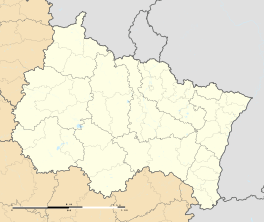Bischwiller
| Bischwiller Bìschwiller | ||
|---|---|---|
|
La Laub, former town hall, now a museum | ||
| ||
 Bischwiller | ||
|
Location within Grand Est region  Bischwiller | ||
| Coordinates: 48°46′00″N 7°51′27″E / 48.7667°N 7.857500°ECoordinates: 48°46′00″N 7°51′27″E / 48.7667°N 7.857500°E | ||
| Country | France | |
| Region | Grand Est | |
| Department | Bas-Rhin | |
| Arrondissement | Haguenau-Wissembourg | |
| Canton | Bischwiller | |
| Government | ||
| • Mayor (2008–14) | Nicole Thomas | |
| Area1 | 17.25 km2 (6.66 sq mi) | |
| Population (2006)2 | 12,949 | |
| • Density | 750/km2 (1,900/sq mi) | |
| Time zone | CET (UTC+1) | |
| • Summer (DST) | CEST (UTC+2) | |
| INSEE/Postal code | 67046 / 67240 | |
| Elevation | 123–147 m (404–482 ft) | |
|
1 French Land Register data, which excludes lakes, ponds, glaciers > 1 km² (0.386 sq mi or 247 acres) and river estuaries. 2 Population without double counting: residents of multiple communes (e.g., students and military personnel) only counted once. | ||
Bischwiller (German: Bischweiler) is a commune in the Bas-Rhin department in Grand Est in northeastern France just west of the Moder River.[lower-alpha 1]
Geography
The city is 7.8 kilometers (4.8 mi) southeast of Haguenau, 8 kilometers (5.0 mi) west-northwest from the German border and the Rhine River (Rhin), and lies 22 kilometers (14 mi) north-northeast of Strasbourg.
The Moder river, a Rhine tributary, flows across the town. Among the other streams which cross the area can be cited the following tributaries of the Morder: the Rothbaechel, the Erlengraben and the Waschgraben. The last one is formed by the confluence of two smaller streams named Weihergraben and Schnuchgraben.
Population
Due to its large Turkish minority, Bischwiller is often dubbed "Turkwiller".[2]
| Historical population | ||
|---|---|---|
| Year | Pop. | ±% |
| 1793 | 3,250 | — |
| 1800 | 3,449 | +6.1% |
| 1806 | 3,902 | +13.1% |
| 1821 | 4,806 | +23.2% |
| 1831 | 5,927 | +23.3% |
| 1836 | 5,854 | −1.2% |
| 1841 | 5,721 | −2.3% |
| 1846 | 6,260 | +9.4% |
| 1851 | 6,642 | +6.1% |
| 1856 | 7,676 | +15.6% |
| 1861 | 8,780 | +14.4% |
| 1866 | 9,911 | +12.9% |
| 1869 | 11,500 | +16.0% |
| 1871 | 9,220 | −19.8% |
| 1875 | 7,102 | −23.0% |
| 1880 | 6,827 | −3.9% |
| 1885 | 6,815 | −0.2% |
| 1890 | 7,014 | +2.9% |
| 1895 | 7,304 | +4.1% |
| 1900 | 7,897 | +8.1% |
| 1905 | 8,279 | +4.8% |
| 1910 | 8,149 | −1.6% |
| 1921 | 7,210 | −11.5% |
| 1926 | 8,142 | +12.9% |
| 1931 | 8,059 | −1.0% |
| 1936 | 8,248 | +2.3% |
| 1946 | 7,581 | −8.1% |
| 1954 | 7,843 | +3.5% |
| 1962 | 8,198 | +4.5% |
| 1968 | 8,780 | +7.1% |
| 1975 | 9,653 | +9.9% |
| 1982 | 10,612 | +9.9% |
| 1990 | 10,969 | +3.4% |
| 1999 | 11,596 | +5.7% |
| 2006 | 12,830 | +10.6% |
| 2009 | 12,646 | −1.4% |
Personalities
- Henri Baumer, master carpenter
- Claude Vigée, poet
- Jacob Kirkman and Abraham Kirkman, harpsichord makers
- Jean Daum, glassware manufacturer
- Lucien Muller, footballer
- Otto Meißner, German politician
- Christian Goodnight (born Christian Gutknecht) is a direct-line ancestor of U.S. President Barack Obama.[3][4][5][6]
Photo gallery
-
Ancient timber-framed pharmacy
-
Saint-Augustin church
-
Bischwiller town hall
-
Protestant temple: tombstone of John I, Count Palatine of Zweibrücken (died in 1604) tombstone
See also
Notes
- ↑ Rapp 1823, pp. 365–366.
- ↑ Le Point. "Alsace le ghetto turc". Retrieved 2014-12-14.
- ↑ Forek, Scott (September 9, 2007). "Christian Gutnecht-Goodnight: 'The dark and bloody ground'". Chicago Sun-Times. Retrieved March 20, 2009.
- ↑ Neue Zürcher Zeitung 24 juillet 2008, Die Zeit of the same day, and Zeitmagazin Leben 24.7.2008, N.31, p.14-15 (the article in the Zeitmagazin contains a complete genealogy of Barack Obama)
- ↑ "Obama's forefathers include Swiss immigrant: archivist". Agence France-Presse. September 24, 2008.
- ↑ Harneis, Robert (January 20, 2009). "Goodnight Mr. President". French News. Retrieved March 20, 2009.
References
- INSEE commune file
- Rapp, comte Jean (1823), Memoirs of General Count Rapp: First Aide-de-camp to Napoleon, H. Colburn and Company
External links
| Wikimedia Commons has media related to Bischwiller. |
- Official website (French)
